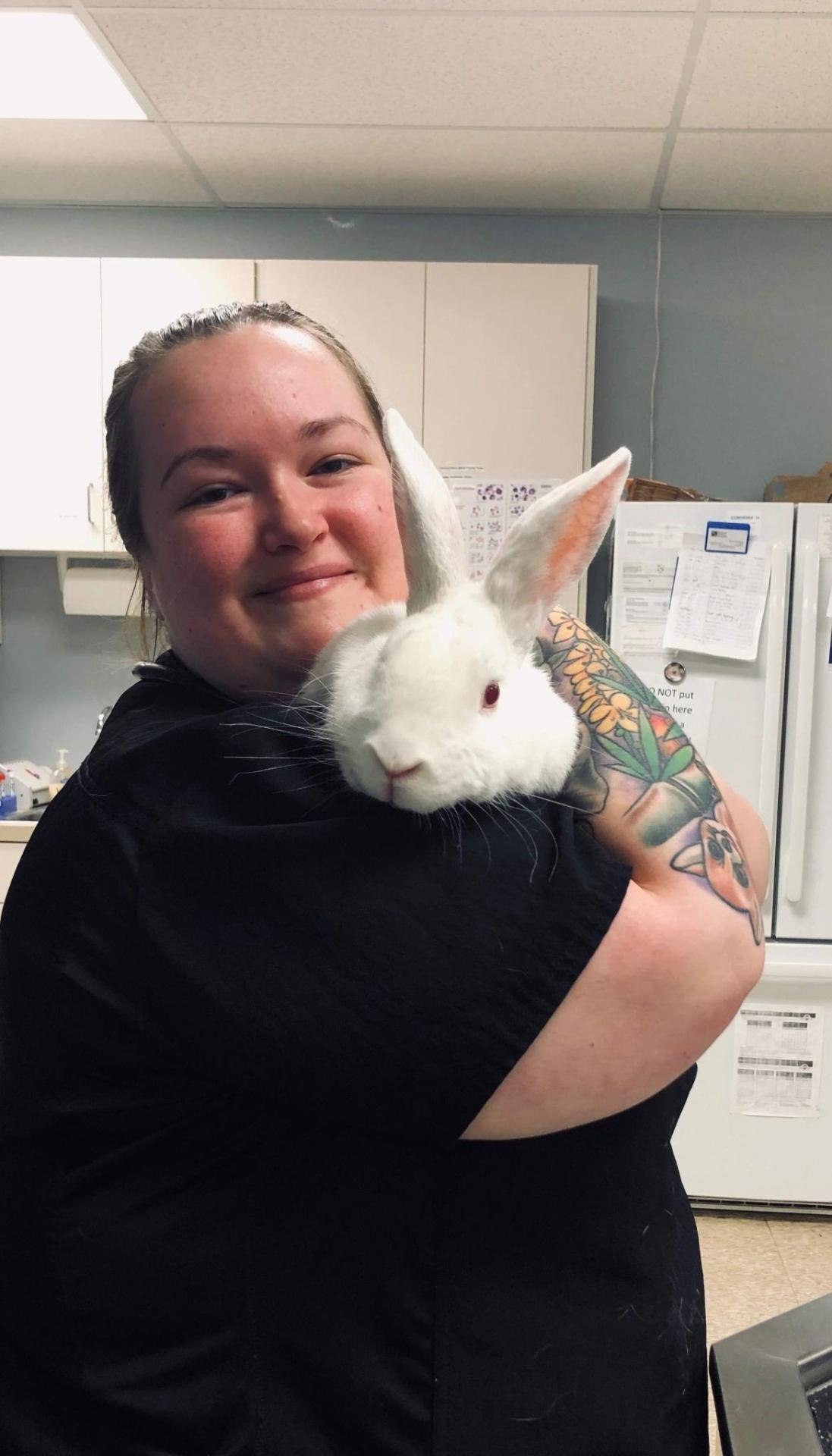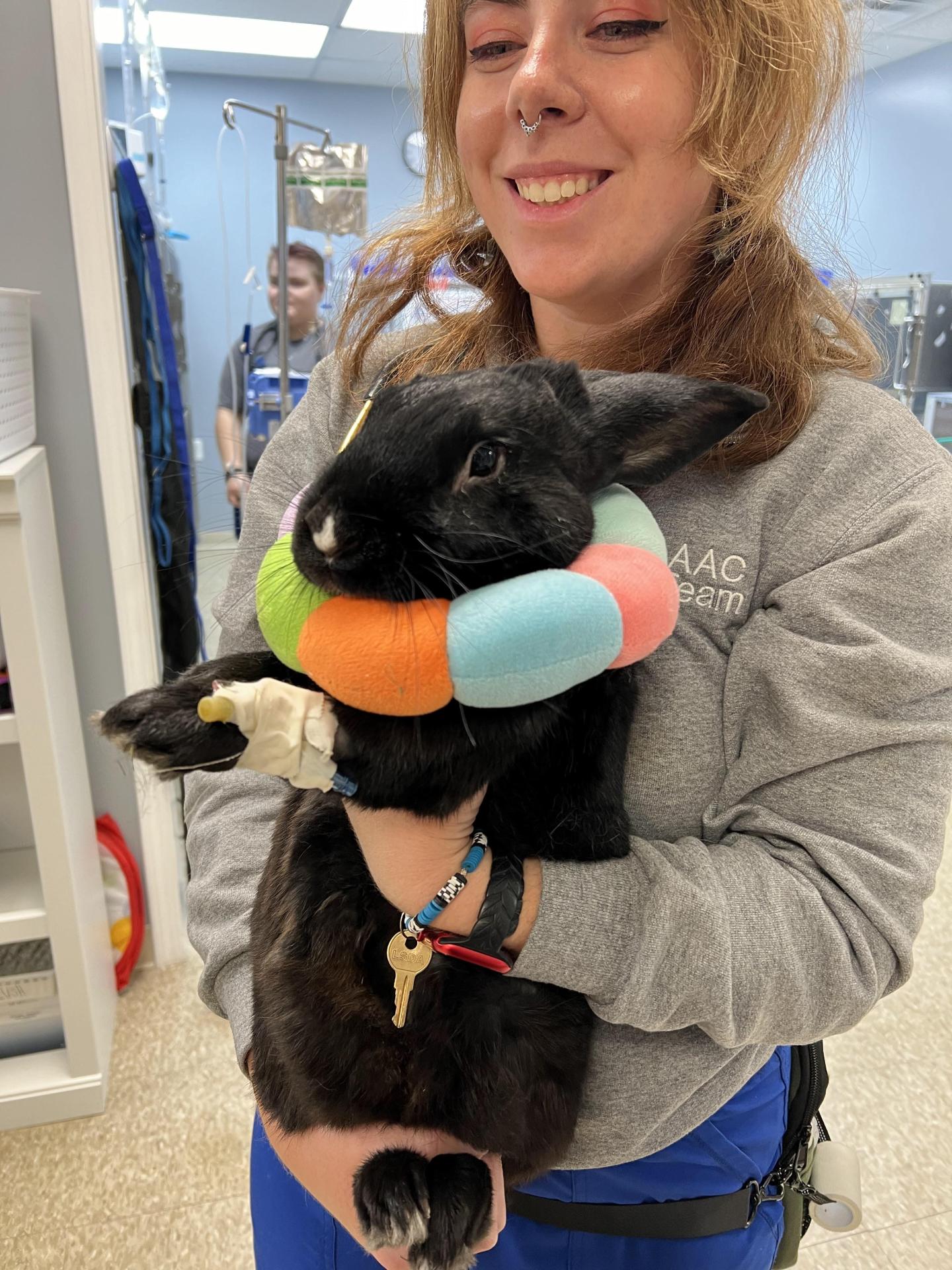Rabbit Care at Advanced Animal Care ER
Expert and Compassionate Care for Your Pet Rabbit
At Advanced Animal Care ER, we understand that rabbits are intelligent, social, and sensitive creatures that require proper care and attention. Whether you’re a first-time rabbit owner or a long-time enthusiast, our team is here to provide the best care for your bunny, from routine wellness exams to emergency treatments. We’re committed to ensuring your rabbit stays happy and healthy for many years. 
What to Expect During Your Rabbit's Visit:
When you bring your rabbit to Advanced Animal Care ER, you can expect comprehensive and compassionate care. Here’s what to expect during an initial visit:
-
Comprehensive Physical Exam: Our veterinarian will perform a thorough exam to check your rabbit’s overall health, including their teeth, ears, eyes, fur, and body condition.
-
Diet and Environment Review: We’ll discuss your rabbit’s diet, living space, and any behavioral changes to ensure they are receiving optimal care.
-
Diagnostic Testing: If needed, we may recommend diagnostic tests such as bloodwork, fecal exams, or x-rays to identify any health concerns.
-
Personalized Care Plan: Based on the exam and test results, we will provide a tailored care plan for your rabbit, which may include dietary adjustments, lifestyle changes, or treatment for any health issues.
Common Rabbit Health Concerns We Treat:
Rabbits are prone to several health issues that require prompt veterinary attention. Some of the most common concerns we address include:
-
GI Stasis: A condition where the rabbit's digestive system slows down or stops, often causing lethargy, loss of appetite, and bloating.
-
Respiratory Infections (Snuffles): Rabbits can develop pneumonia or other respiratory infections, leading to coughing, sneezing, and nasal discharge.
-
Rabbit Hemorrhagic Disease (RHD): A deadly viral disease that causes sudden death in rabbits.
-
Ear Mites: Small parasites that can cause itching, discomfort, and potential ear infections
 .
. -
Sore Hocks: A condition caused by pressure sores on the rabbit’s feet, typically from inadequate bedding or standing on hard surfaces.
-
Dental Problems: Rabbits' teeth grow continuously and need to be worn down by chewing. Overgrown teeth can lead to severe pain, difficulty eating, and other health problems.
-
Flystrike: A condition where flies lay eggs in a rabbit’s fur, and the resulting larvae can infest the skin, causing severe discomfort and infection.
Prompt care can prevent or treat these issues and ensure a long and healthy life for your rabbit.
Rabbit Care FAQs:
How do I transport a rabbit to the vet?
Transport your rabbit in a small, secure carrier with soft bedding and ensure the carrier is well-ventilated. Avoid using plastic carriers that don’t allow your rabbit to breathe easily, and keep the carrier stable during travel to minimize stress.
What type of mammals are rabbits and rodents?
Rabbits belong to the order Lagomorpha, not rodents, although they share similarities. They are distinct from rodents, which belong to the order Rodentia.
What's the difference between bunnies and rabbits? And the difference between a rabbit and a hare?
The term “bunny” is often used informally to refer to young rabbits, while “rabbit” refers to the adult animal. Hares are larger, have longer legs, and are born with fur and open eyes. Rabbits, on the other hand, are born hairless and blind.
What do bunnies eat?
Rabbits need a high-fiber diet, consisting primarily of hay (such as timothy hay), supplemented with fresh vegetables (like leafy greens, carrots, and bell peppers) and pellets formulated for rabbits. Fresh water should always be available.
Are rabbits good pets?
Yes, rabbits can be wonderful pets. They are affectionate, intelligent, and enjoy interacting with their owners. However, they require time, space, and care, including regular grooming and attention to their environment.
What do bunnies need - what should I have at my house for my pet bunny?
Bunnies need:
-
A large cage or enclosed area for exercise
-
Hay and fresh vegetables
-
A safe place to chew and explore (e.g., chew toys)
-
Litter box (rabbits can be litter trained)
-
Comfortable bedding (avoid cedar or pine, use paper-based bedding)
Where do bunnies like to be pet? Do rabbits get fleas?
Rabbits enjoy being pet on the head, ears, and neck. They typically don’t get fleas, but they can get other parasites, such as ear mites or intestinal worms.
What is a safe flea treatment for rabbits?
Fleas are rare in rabbits, but if your rabbit has fleas, it's important to consult with a veterinarian before applying any treatments. Some flea treatments can be toxic to rabbits.
Do rabbits get ear mites, and what is the treatment?
Yes, rabbits can get ear mites. Treatment involves applying a topical medication prescribed by a veterinarian to eliminate the mites.
Do rabbits need shots or vaccinations, and at what age do rabbits need vaccinations?
Rabbits should be vaccinated for Rabbit Hemorrhagic Disease (RHD) and Myxomatosis. These vaccines are typically given when the rabbit is 6-8 weeks old, with boosters as needed.
What does rabbit poop look like? What does sick rabbit poop look like? And do rabbits eat their poop?
Rabbit poop is small, round, and pellet-like. Sick rabbit poop may be diarrhea, soft, or stringy. Rabbits also produce cecal pellets, which they eat to absorb nutrients.
Do rabbits carry diseases?
Rabbits can carry diseases like Myxomatosis and Rabbit Hemorrhagic Disease (RHD). Regular veterinary check-ups and vaccinations help prevent these diseases.
Is there a rabbit runny eye or eye infection home treatment?
If your rabbit has a runny eye, it could be due to an infection or irritation. Clean the area with saline solution and contact your vet if symptoms persist or worsen.
What do I do if I have a sick rabbit that's not eating?
A rabbit that refuses to eat is a medical emergency. You should bring them to a veterinarian as soon as possible, as GI stasis (lack of movement in the digestive system) can be life-threatening.
Are there poisonous plants for rabbits, and what are the symptoms my rabbit ingested something toxic?
Yes, many plants are toxic to rabbits, including lilies, daffodils, and tulips. Symptoms of poisoning include lethargy, diarrhea, drooling, and vomiting. Always ensure your rabbit only eats rabbit-safe plants.
Can rabbits make humans sick? Can humans make rabbits sick?
Rabbits can carry zoonotic diseases like salmonella, which can be transmitted to humans. Humans can also pass illnesses to rabbits, so good hygiene practices are essential.
What is the body language of a sick rabbit?
A sick rabbit may show signs of lethargy, lack of appetite, hunched posture, rapid breathing, or an abnormal gait.
How do I know if my rabbit went into shock, and what is rabbit shock treatment?
Signs of shock include weakness, rapid breathing, and cool extremities. Treatment involves warming the rabbit, keeping it calm, and seeking veterinary care immediately.
How soon should you bring your pet in to see a veterinarian for changes in behavior, such as not eating or drinking?
If your rabbit isn’t eating or drinking, or shows drastic behavior changes, bring them to the vet within 24-48 hours.
Signs Your Rabbit Needs Immediate Care:
If your rabbit exhibits any of the following symptoms, it may need urgent care:
-
Not eating or drinking
-
Lethargy
-
Diarrhea or abnormal stool
-
Labored breathing
-
Bleeding or unusual discharge
If you notice any of these signs, contact us immediately for urgent care.
How to Schedule an Appointment:
To schedule an appointment for your rabbit, call Advanced Animal Care Emergency at 859-625-5678. Our team is here to provide the best care for your rabbit companion.
